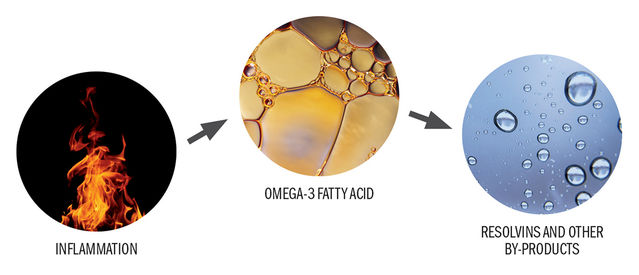Nipping Stress With Nutrients
Omega-3 fatty acids, vitamin B, and vitamin C take different routes to tackle stress.
By Abigail Fagan published April 17, 2020 - last reviewed on May 5, 2020

A wave of worry seems to be washing over the United States. Americans are more stressed, worried, and angry now than at any other point in the previous decade, according to the Gallup 2019 Global Emotions Report. Nearly 50 percent of people believe they are more stressed now than they were five years ago, reports the American Institute of Stress.
Stress is often tied to pillars of life—a job, relationship, finances—that are difficult to change or adjust. But there is a domain in which it’s possible to exercise far more control—diet.
The food that we consume can strongly influence mental health. Some nutrients may particularly contribute to stress-resistance. Recent research suggests that they include omega-3 fatty acids, vitamin C, and vitamin B, consumed in food or supplements.
Whether stress shows up as a simple stomachache or a serious anxiety disorder, it can generate long-term consequences. That fact prompted an international team of researchers to investigate whether nutrients could buffer against those repercussions.
Scientists exposed adolescent rats to social stress, which led to emotional distress and memory impairment that lasted through adulthood. But for the 50 percent fed a typical diet enriched with omega-3 fatty acids and vitamin A, memory was as robust as that in rats that were not subjected to stress, and there were no signs of distress. The enriched diet also thwarted changes in the composition of the microbiome associated with depression.
The ability to translate findings from rodents to humans is never certain, but the implications are promising. “The protection for the animals with the enriched diet was amazing,” says senior author Maria Passani. “We achieved complete prevention.”
Scientists don’t completely understand how omega-3 fatty acids deliver protection. But evidence implicates inflammation as a key player in stress and depression.
Omega-3 fatty acids have powerful anti-inflammatory properties. Chronic stress can trigger a chain reaction that leads to the release of inflammatory substances that subvert neurotransmission, resulting in depression. As they are metabolized by the body, omega-3 fatty acids produce key by-products, called resolvins, that temper inflammation.
Nutrients alone will not reverse the damage done by stress, Passani says. But supplementation could be an important adjunct to other treatments.
Another valuable nutrient is vitamin C, perhaps best known as an antioxidant. Surprisingly, vitamin C is a stress hormone, says Paul Marik, a professor at Eastern University Medical School. All animals produce it in response to stress—except primates, guinea pigs, and certain species of fish.
Animals unable to produce vitamin C unleash a flood of cortisol instead, which magnifies the stress response. Many critically ill humans are vitamin C-deficient, and administering the vitamin is linked to better outcomes for sepsis patients, Marik reports.
Vitamin B has long buffered the nervous system. Scientists in Australia recently analyzed every clinical trial that tested the effects of daily vitamin B supplementation on stress, anxiety, and depression. Eleven of the 18 trials found that people reported better moods when they took vitamin B compared to a placebo. Vitamin B particularly benefited those with stress.
“Vitamins B and C are required for neurotransmission, so they would affect cognition,” Marik says. “Diet and nutrition should work together with conventional medicine. They are conventional medicine.”
Key Facts
- Omega-3 is a class of polyunsaturated fats that deliver health benefits to many systems in the body.
- They are critical for development of the nervous system and insulate pathways of neural communication.
- Supplements of omega-3 fatty acids can improve neuroplasticity and cognitive flexibility.
- Greater aggression, anxiety, and depression are all linked to omega-3 deficiency.
- The eight B vitamins are not chemically related but often occur in the same foods.
- Vitamin B contributes to gene regulation by DNA methylation. It also clears excess levels of the amino acid homocysteine.
- Creation and regulation of the neurotransmitters dopamine and serotonin rely in part on vitamin B.
- The brain is the body’s greatest consumer of vitamin C.
- Vitamin C is essential to cognitive performance; it helps form the myelin sheath that surrounds nerves and speeds the signaling process.
Resourceful Resolvins

